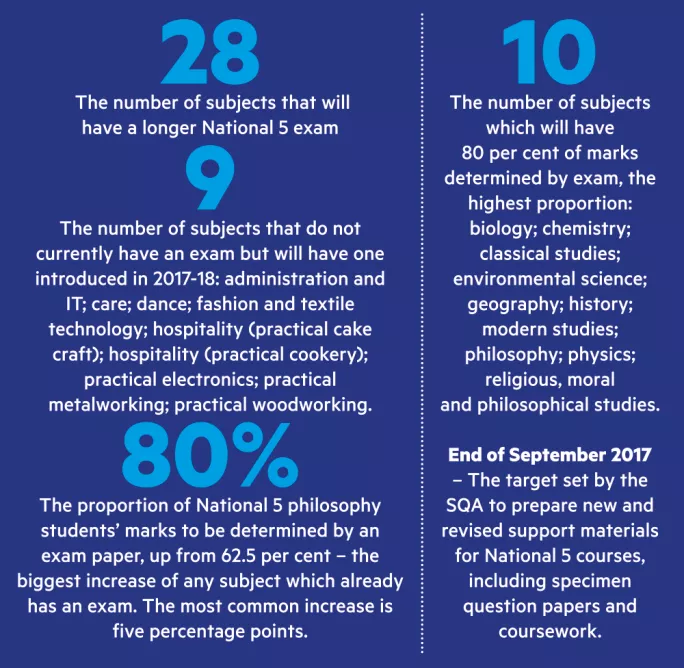High-stakes exams are back, teachers warn

New and expanded National 5 question papers represent a resurgence of high-stakes exams that risk undermining pupils’ educational prospects, teachers are warning.
Concerns are being voiced as a TESS analysis shows that 28 out of 42 National 5 subjects will require pupils to sit longer exams in 2017-18, while nine practical subjects will now have an exam where none previously existed. The five other subjects will have new or increased coursework to contend with.
There are also fears that a move designed to ease teacher workload may have the opposite effect, while many teachers have complained that the profession was not adequately consulted about the changes.
The changes in the weighting of the assignment and the external exam could make it more difficult for borderline pupils to pass
Education secretary John Swinney decided last year to scrap unit assessments - starting with National 5 and ending with Advanced Higher in 2019-20 - amid union protests that they added unnecessarily to teachers’ workload by duplicating swathes of coursework.
But the publication last week of Scottish Qualifications Authority (SQA) information breaking down what the changes could mean for each subject has prompted an angry reaction from teachers and education experts.
Chris Mackay, president of the Scottish Association of Teachers of History, said “many people are unhappy” about the N5 changes.
“The implications for pupils are a concern,” he explained. “The changes in the weighting of the assignment and the external exam could make it more difficult for borderline pupils to pass.”
Lengthening the time of exams could also affect pupils who already required special support, he feared.
But Mr Mackay had “a great deal of sympathy for the people at the SQA” who had been “left with a major problem” after the announcement that unit assessments would be removed.
University of Edinburgh honorary fellow and former secondary headteacher Danny Murphy said there was already “too much pressure” and “too much assessment” at the end of S4, even before the changes.
The ‘right thing to do’
The latest details showed that “the senior phase doesn’t articulate Curriculum for Excellence at all” and “prevents teachers from doing the job we want to do”, added Mr Murphy, who recently co-edited a book on 50 years of comprehensive education in Scotland.
Seamus Searson, general secretary of the Scottish Secondary Teachers’ Association, said removing unit assessments remained the right thing to do, but that in the past week many members had contacted the union with workload concerns.
Many feared they would struggle to get courses ready in time for the next school year, he added. There were also concerns that a greater emphasis on exams would disadvantage many pupils.
The union has relayed concerns that there was not adequate consultation with the profession about the move.

EIS union general secretary Larry Flanagan remained confident that the changes would ”absolutely reduce workload” but said he understood teachers’ concerns, as he felt that national bodies had not done a good job of communicating the plans.
The resultant “confusion” had obscured the fact that, while unit assessments would no longer be available for students doing a full National 5, freestanding unit assessments would remain an option for other pupils, he added.
Mr Flanagan’s biggest concerns were around the tight timescales for implementation - some key information may not be available to teachers until the end of September - and the need to ensure that National 5 students who struggled to achieve that qualification would continue to have a fallback.
He stressed that in most cases, the proportion of a pupil’s grade determined by exam papers would increase by a relatively small amount.
Mr Swinney told TESS that the new arrangements were “definitely not” a move back towards high-stakes exams, because the relative weightings of practical assignments and exams remained “roughly the same”.
An SQA spokesman insisted that the removal of units and the strengthening of course assessments would have a positive impact on workload for teachers and candidates, “while maintaining the integrity and credibility of the national qualifications”.
He said: “For the vast majority of courses, there are no changes to course content and these revisions to assessment adhere to the core principles of Curriculum for Excellence.
“Internally assessed aspects of course assessment had always been a feature for some subjects - for example, speaking and conversation in languages, performance in PE, practical and process activities in design and manufacture, etc.”
He added: “Consultation on these changes was conducted through our existing channels of teacher and lecturer engagement, such as our network of National Qualifications Support Teams for each subject, which includes teachers, lecturers, professional associations and higher education.”
You need a Tes subscription to read this article
Subscribe now to read this article and get other subscriber-only content:
- Unlimited access to all Tes magazine content
- Exclusive subscriber-only stories
- Award-winning email newsletters
Already a subscriber? Log in
You need a subscription to read this article
Subscribe now to read this article and get other subscriber-only content, including:
- Unlimited access to all Tes magazine content
- Exclusive subscriber-only stories
- Award-winning email newsletters